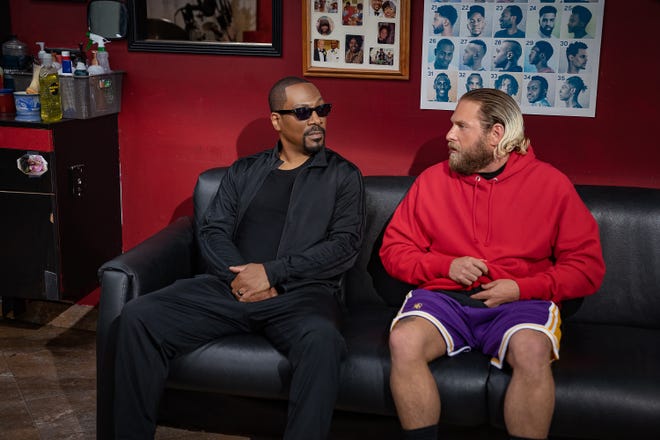
Race relations in the United States these days are nothing to laugh about.
But Jonah Hill and Kenya Barris are asking you to do just that with Netflix's romantic comedy “You People" (streaming Friday), about a nice Jewish boy named Ezra (Hill) who falls in love with a proud Black girl named Amira (Lauren London).
The couple clicks, whether canoodling under the sheets or conversing about urban music and streetwear. Their respective parents? Not so much. And therein lies the tension and comedy in this modern-day spin on “Guess Who’s Coming to Dinner?”
“We knew some things could be inflammatory,” says director Barris, creator of ABC's “Black-ish,” who wrote the new film with Hill. “So our actors had to be 10 toes down in (the shoes of) their characters.”
More:Eddie Murphy jokes about Will Smith slap in Cecil B. DeMille Award speech at Golden Globes

Ezra’s overly-woke parents are played by Julia Louis-Dreyfus and David Duchovny. Amira’s folks, coolly embodied by Eddie Murphy and Nia Long, are devout Muslims barely keeping their displeasure at a low simmer.
When the happy couple finally gathers both sets of parents for a get-to-know-you dinner, Murphy and Louis-Dreyfus showcase their considerable comedy chops, some it forged together as cast members at “Saturday Night Live” in the early 1980s.
“This was so fun because I haven’t gotten to spend much time together with Eddie since we were in, well, I was going to say college,” says the "Seinfeld" legend. “But I meant ‘SNL,’ which in a weird way was like going to grad school,” she says. “So it was a school reunion of sorts. He’s such a charming human being and he knows funny, and we had a blast pinging off each other.”

Barris says writing lines that made Murphy laugh was “like scoring on Michael Jordan,” adding that Murphy’s decision to play Nation of Islam devotee Akbar Mohammed, in a tightly controlled way, “only makes his performance more powerful.”
Mutual 'fanboys' Hill and Barris created a movie based on their love of LA
Ultimately, "You People” was envisioned less as a lesson on race and more as a “love letter to Los Angeles and culture and love itself,” says Barris, who notes that although he and Hill grew up in largely Black and white areas of Los Angeles, they share cultural touch points nurtured by that entertainment-fueled melting pot.
Netflix remakes a classic:A new take on 'All Quiet on the Western Front' grabs Oscar nominations
Barris says when he and Hill first met, the two quickly became mutual fanboys. “Jonah is in the top three on-the-fly improv guys in the world,” says Barris.
Hill and Barris met up a few years back to discuss a collaboration, which “turned into a three-hour talk about relationships, kids and LA." A movie idea was born.

“I guess in some ways, although we started on this three years ago, our story is about where we are now as a culture, with Blacks and Jews in particular in an Olympics to decide who has it worst,” says Barris. “But we felt the key with the movie was to not try and be evocative, but just to be honest.”
When you bring diverse cultures together, the honest result sometimes is both evocative and provocative, says Long.
More:Nia Long says 'Fresh Prince' co-star Will Smith 'carried a burden' to represent 'perfection'
She crafted her character, Fatima Mohammed, as a “stand by your man” wife who supports her husband while trying to ensure her daughter's happiness.
“You get groups whose practices are opposite and it’s going to create a very funny situation, from top to bottom,” says Long. “But honestly, in the end, I think we have more in common than we think we do.”

Louis-Dreyfus channeled 'hyper well-intentioned' acquaintances for role
Louis-Dreyfus says “You People” sets out to amuse, not lecture.
“The movie takes the romantic comedy trope and applies racial and cultural conflicts on top of it, which makes the story push the envelope,” she says. “Because the subject matter is so serious, the fact that it’s done comedically is very powerful.”
For her character, Shelley Cohen, Louis-Dreyfus channeled “white people on the west side of LA who are hyper well-intentioned, with hyper in all caps, in a way that becomes offensive,” she says.
Louis-Dreyfus says it was important that the Cohens came across as “happy in their marriage,” despite their cultural myopia.
“Look, in the end, we’re not trying to teach lessons here,” she says. "We want people to be entertained, and maybe it also opens up another line of dialogue between people who are different. That would be nice.”
Source link








